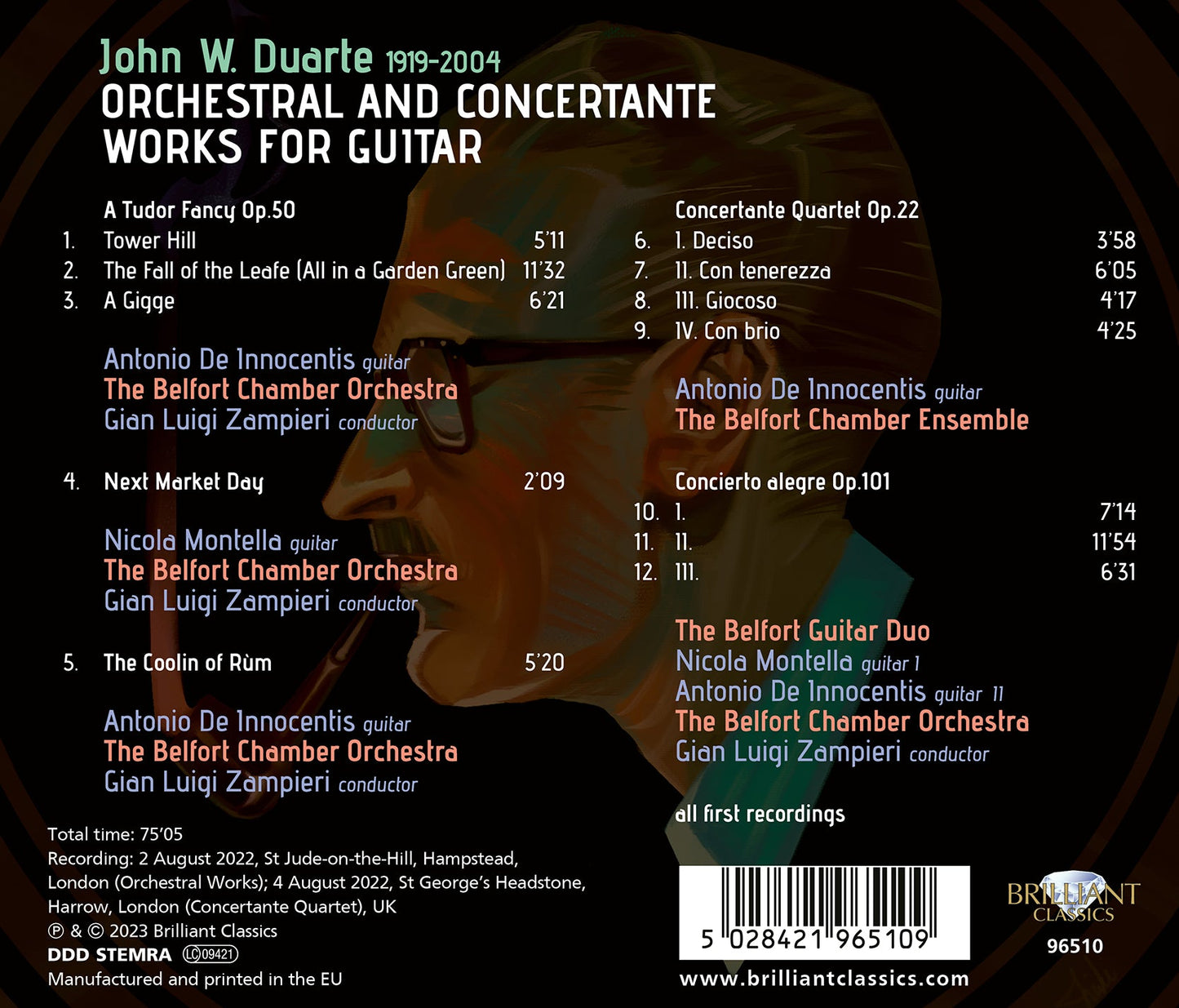Duarte: Orchestral & Concertante Works For Guitar
Duarte: Orchestral & Concertante Works For Guitar
Couldn't load pickup availability
John W. Duarte was born in Sheffield, England on 2 October 1919. His father was a Scottish soldier, who died in 1919, and he was raised by his mother and maternal grandparents. He started playing the ukulele, but soon moved to the guitar at the age of 15. The advent of guitar phenomenon John Williams, whom Duarte taught for 18 months before the young musician’s entry into the Royal College of Music, London, gave the composer an opportunity to expand his chamber music oeuvre. An article by Williams’s father, Len, in The Classic Guitar Journal (January–April 1956) informed readers that ‘Duarte is already at work’ on what became the Concertante Quartet Op.22, a substantial work in four movements. The 1st movement, in a Neo-Baroque style, is in Sonata form with a substantial guitar cadenza. The sharp-eared listener may hear a reference to the folk song ‘Barbara Allen’. The 2nd movement is a lovely lilting siciliana, and the opening theme is first a guitar solo, then for violin with a guitar descant in the style of Renaissance divisions. The 3rd movement, also arranged as a guitar duet for the Presti/Lagoya duo in 1964 under the title Badinerie, also suggests baroque origins. In 2021 the composer’s son, Christopher Duarte, discovered some folk songs arranged for guitar and small orchestra among his father’s manuscripts. There is no mention of these arrangements in his list of works and no correspondence relating to their creation, but from the composer’s handwriting these probably date from the mid-late 1950s and may have been written for John Williams to play with fellow RCM students. Next Market Day, scored for piccolo, snare drum and strings, is an energetic rendering of an Irish love song which Duarte revisited several times. The Coolin of Rùm (or, The Rùm Cuillin), scored for flute, oboe and strings, is a tune from the Isle of Rùm, one of the small islands near the Isle of Skye in the Hebrides. Cuillin is the name for a range of mountains in this area and Duarte may have been alluding to the name of a previous owner of Rùm, Maclean of Duart. Duarte began work on what became A Tudor Fancy in early 1967, at the suggestion of the great French guitarist, Ida Presti. The composer wrote: ‘The 1st movement is based on Tower Hill by Giles Farnaby, named after the area outside the Tower of London where executions used to take place. The 2nd movement is based on The Fall of the Leafe by Martin Peerson.’ Following A Tudor Fancy, a concerto in all but name, nearly 15 years would pass before Duarte began work on another concerto. In 1985 he received a commission from Alfonso Montes and Irina Kircher, a Venezuelan/German Duo. The orchestration of the resulting Concierto alegre Op.101 (1986) is deliberately light in woodwind (2 flutes, one each of the rest), a trumpet, strings, but with a battery of percussion, including two vibraphones. As with A Tudor Fancy, the music proceeds in a variety of ‘conversations’, with the orchestration kept deliberately light when the guitars are playing. As a nod to the Venezuelan origins of the duo’s Alfonso Montes, Duarte included a reference to the opening of Antonio Lauro’s waltz, La Negra, in the 1st movement. The "cheerful" (alegre) aspect of the concerto’s title is immediately apparent with flutes and guitars duetting. The 2nd movement is in a lilting 6/8, the use of the vibraphone(s) and the often piquant and surprising harmonies provide much interest when the instrumentation changes. The last movement is overtly joyous and maybe a little stylised, with bongos and claves setting up a base for the stepwise theme in the guitars and flutes.
Share


Product Description:
-
Release Date: August 25, 2023
-
UPC: 5028421965109
-
Catalog Number: BRI96510
-
Label: Brilliant Classics
-
Number of Discs: 1
-
Composer: John Duarte
-
Orchestra/Ensemble: The Belfort Chamber Ensemble, The Belfort Chamber Orchestra
-
Performer: Antonio De Innocentis, Nicola Montella


